6.2 Gesellschaftliche Probleme zu identifizieren und se zu lösen?
5 min read•june 18, 2024
Nathan Wichert
Nathan Wichert
Wie kann man als individuelle Person helfen, komplizierte gesellschaftliche Probleme zu identifizieren und möglicherweise zu lösen?
Just 100 companies have been the source of more than 70% of the world’s greenhouse gas emissions since 1988, according to a 2017 report from the Carbon Disclosure Project (CDP). The report identifies ExxonMobil, Shell, BP, and Chevron as being among the highest-emitting investor-owned companies since 1988. If fossil fuels continue to be extracted at the same rate over the next 28 years as they were between 1988 and 2017, global average temperatures would be on course to rise by 4°C by the end of the century. This is likely to have profoundly disturbing consequences, including substantial species extinction and global food scarcity risks. So what can we do?
Unverpackte-Laden in Deutschland
- Wenn wir durch die Obst und Gemüseabteilung eines durchschnittlichen Supermarktes gehen, könnten wir manchmal einfach nur noch weinen. Oder so richtig wütend werden über den absurden Plastikberg, der sich da vor unseren Augen auftürmt.- When we walk through the fruit and vegetable section of our average supermarket, it's easy to want to cry. Or it's easy to get really angry because of the absurd mountain of plastic that is piling up before our eyes.
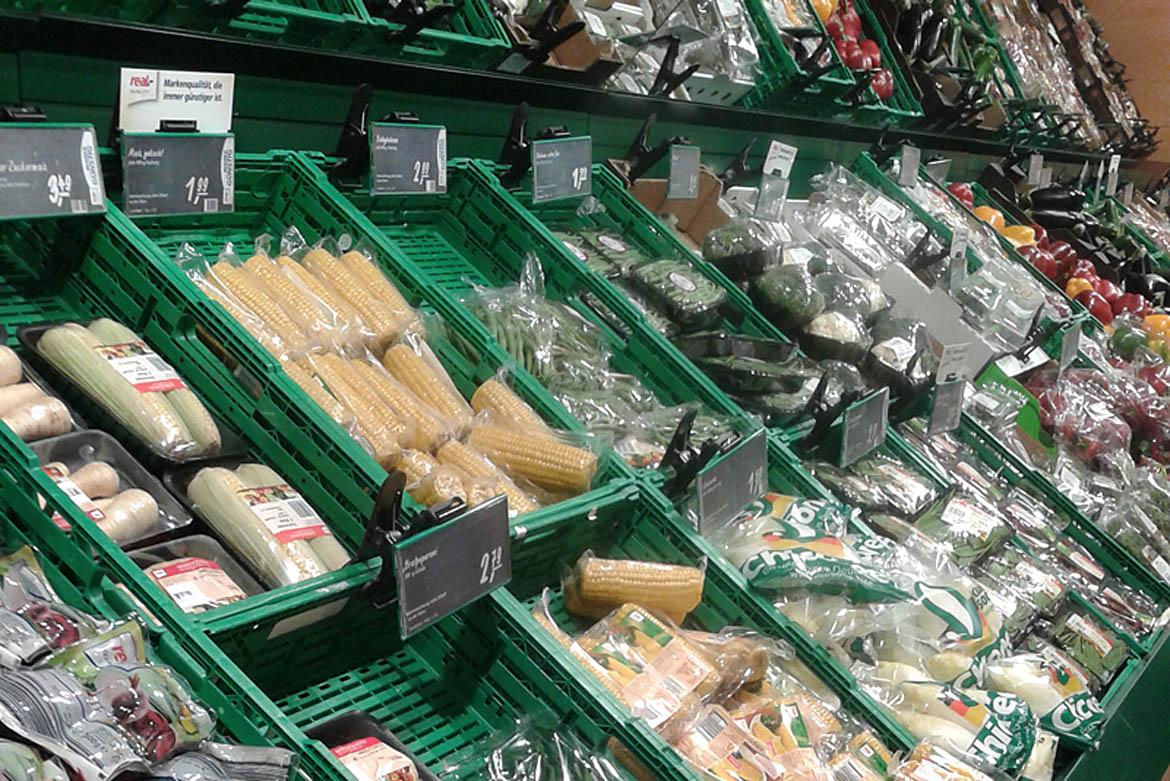
Image taken from vzhh.de
Unverpackt-Läden—was sind sie?
Wie funktioniert das eigentlich mit dem verpackungsfreien Einkauf? Statt auf Regale mit einzelnen Produkten fällt der Blick auf Bulk Bins, Kisten mit losem Obst und Gemüse, große Kanister und Metallfässer mit Flüssig-Waren, Trockenprodukte in stattlichen Glasgefäßen, leere Mehrwegbehälter bevorzugt aus Stoff, Edelstahl oder Glas und vieles mehr.
How does that work with packaging-free shopping? Instead of traditional shelves with individual products, there is a focus is on bulk containers, large storage boxes with loose fruit and vegetables, and large canisters and metal containers with liquid goods (think laundry detergent or shampoo). Dry products like beans and pasta are in large glass jars and everyone uses reusable containers made out of glass or stainless steel.
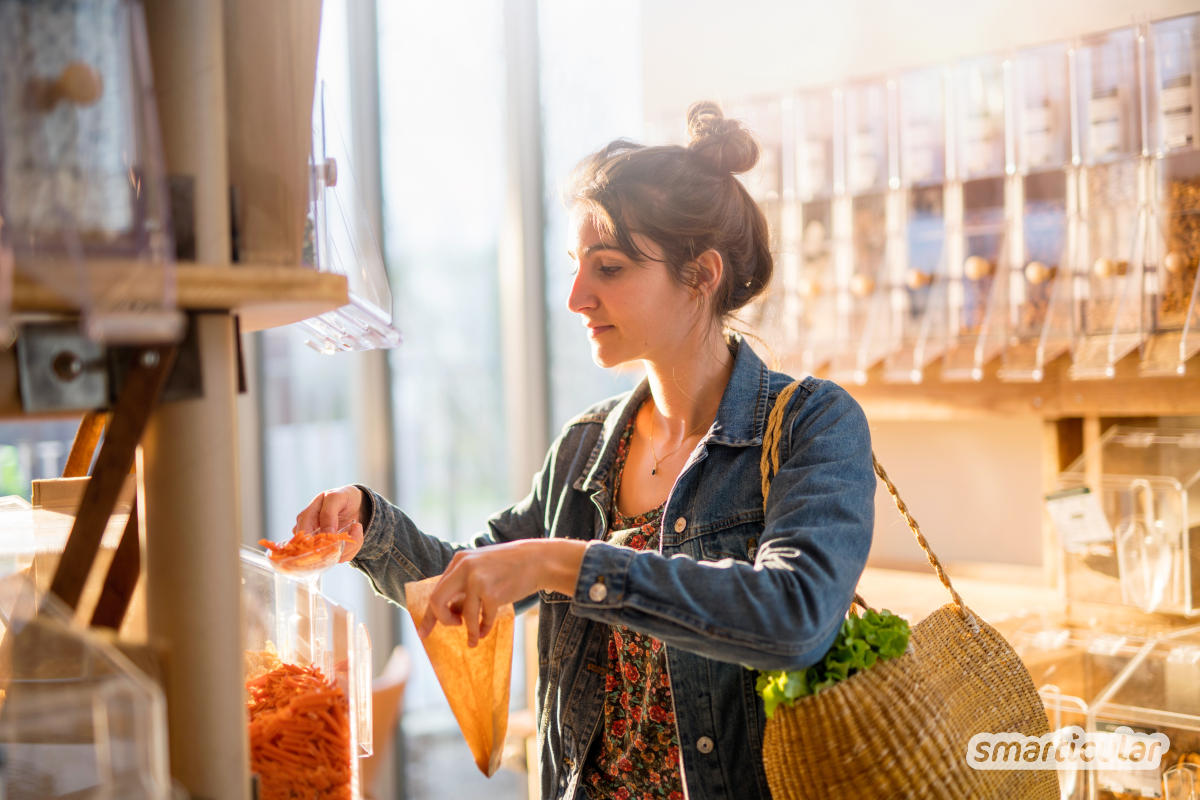
Image taken from smarticular.net
Und im Laden, wie sieht das aus?
Wenn du hier einkaufst, bringst du die Verpackung im Idealfall von zu Hause mit oder kaufst sie im Laden, um sie beim nächsten Mal wieder dabei zu haben. Je nach Produkt, das du kaufen willst, können das, Stoffbeutel, Schraubgläser oder auch Plastikdosen und Papierbeutel sein. Vor dem Einkauf wird die Verpackung abgewogen, damit das Eigengewicht später an der Kasse nicht mitgerechnet wird. Dann kann abgefüllt werden.
If you shop at these types of stores, you will ideally bring your own containers with you from home or buy some in the shop so that you can have them for the next time. Depending on the product you're buying, these containers can be cloth bags, jars with screw-on lids, reusable plastic cans, or even paper bags. The packaging is weighed before shopping so that you don't pay for the container's weight. Once they're weighed and marked, you're free to fill them with whichever product you'll be taking home with you.

Image taken from einbisschengruener.com
Maybe it's time to look at the way we eat. After the fossil fuel industry, the food industry, and in particular the meat and dairy sector, is one of the most important contributors to climate change. In fact, If cattle were their own country, they would be the world’s third-largest emitter of greenhouse gases after China and the US‼️
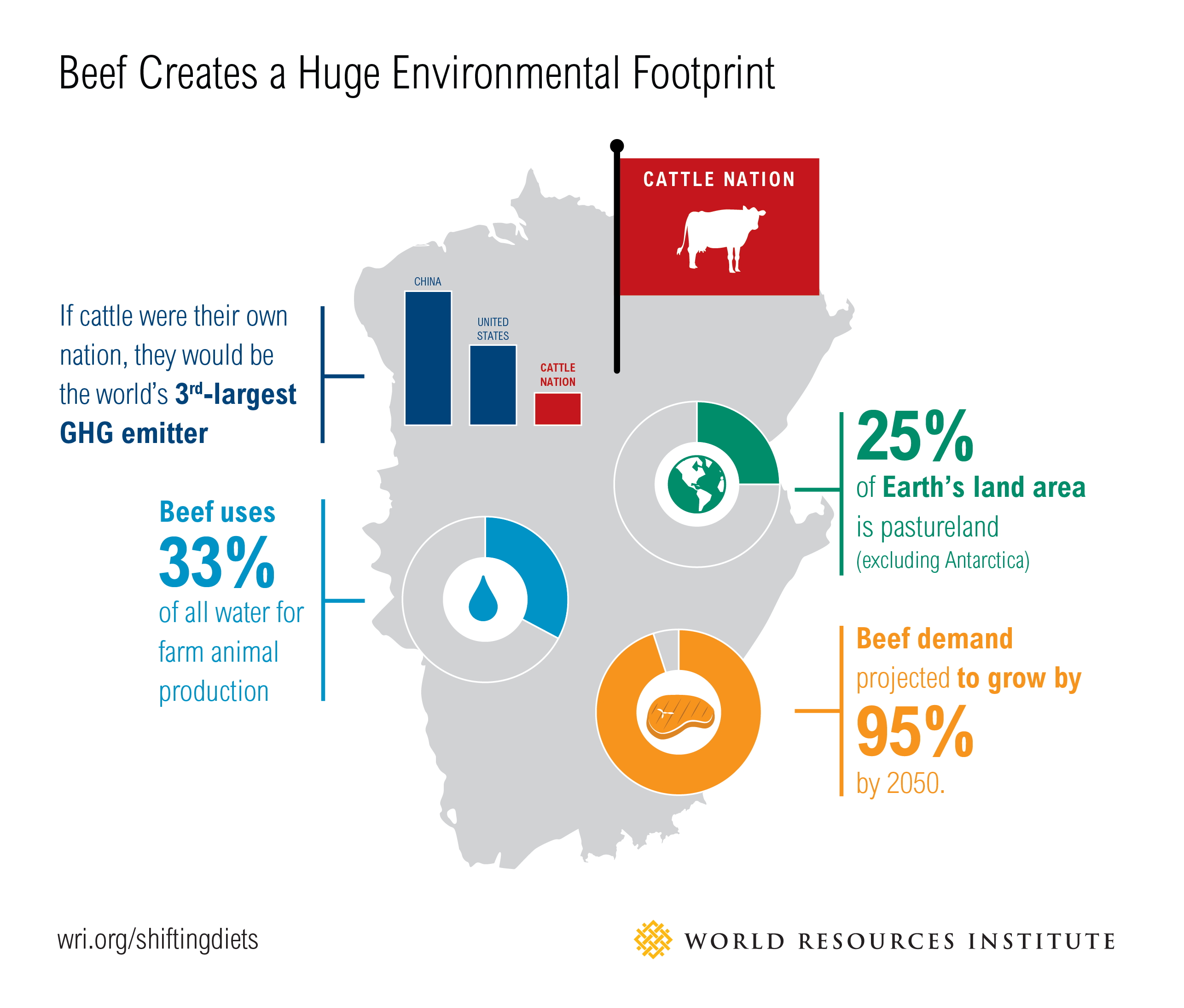
Image taken from wri.org.
Mann muss nicht Veganerin oder Veganerin sein
Du musst nicht all-in gehen. Du kannst beginnen, schrittweise zu reduzieren und ein „ flexitarian“ zu werden. Ein flexitarian ist eine Person, die halbvegetarisch isst. Diese Art der Ernährung konzentriert sich auf pflanzliche Lebensmittel und nur die gelegentliche Einbeziehung von Fleisch.
You don't need to go all in. You can start by cutting down gradually and becoming a ‘flexitarian.’ A Flexitarian is a person who maintains a semi-vegetarian diet. This type of diet is centered around plant foods and only the occasional inclusion of meat.
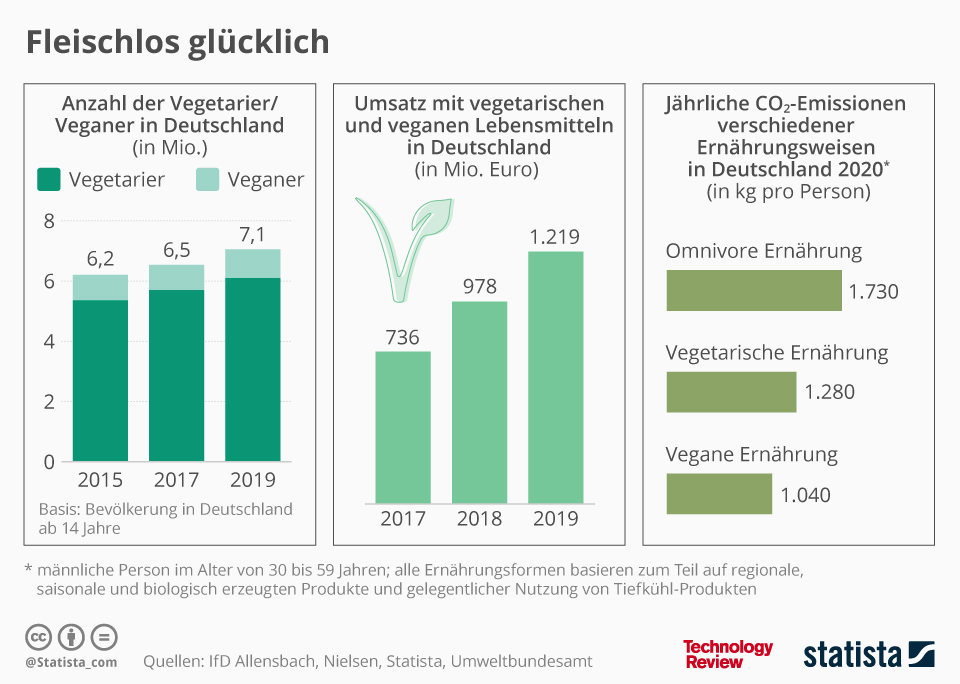
Image taken from heise.de
Ein bisschen summiert sich schnell (A little bit adds up quickly)
Indem Sie deinen Verbrauch an tierischem Eiweiß um die Hälfte (5️⃣0️⃣%) reduzieren, kannst du den CO2-Fußabdruck deiner Ernährung um mehr als 40% senken❗Ein größerer Ansatz könnte so etwas wie das Verbot von Fleisch in einem Unternehmen sein, wie es das Office-Sharing-Unternehmen 'WeWork' im Jahr 2018 getan hat.
By reducing your consumption of animal protein by half (5️⃣0️⃣%), you can cut your diet's carbon footprint by more than 40%❗A larger-scale approach could be something like banning meat across an organization, as office-sharing company WeWork did in 2018.
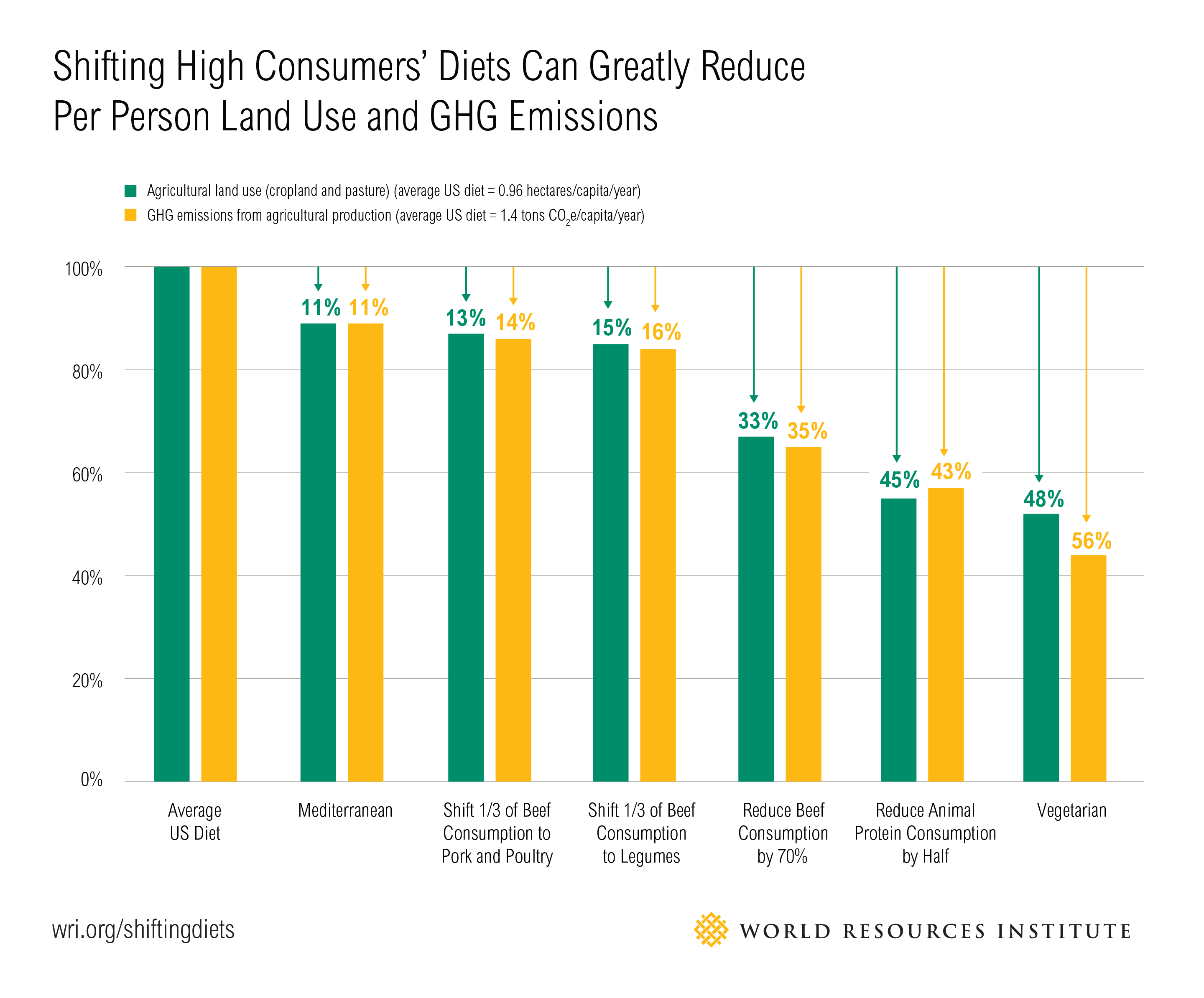
Image taken from wri.org
Dies könnte in Deutschland 🇩🇪 schwierig sein (This might be difficult in Germany 🇩🇪)
Der deutsche Ernährungsreport 2019 zeigt, dass nur ein Prozent (1%) der Befragten sich vegan ernährt und sechs Prozent (6%) essen vegetarisch. Unter den 14- bis 29-Jährigen sind es dagegen elf Prozent (11%). Fast jeder Dritte (28%) isst täglich Fleisch oder Wurst.
The 2019 German Nutrition Report shows that only 1% of the respondents reported being vegan and 6% reported being vegetarian. Within the range of ages 14-29, 11% of respondents reported being either vegan or vegetarian. Almost 1/3 of respondents (28%) said they eat meat or sausage every day.
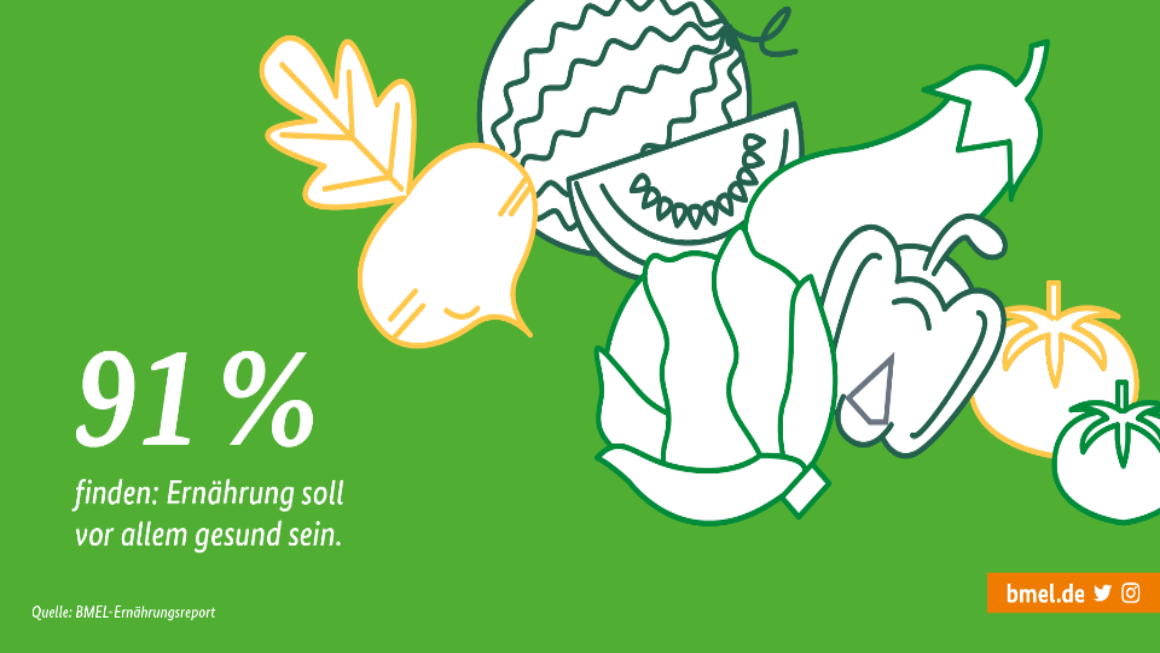
Image taken from bmel.de
Was ist den Deutschen wichtig?
Der Geschmack ist dem aktuellen Ernährungsreport zufolge das wichtigste Kriterium. Immerhin 99 Prozent der Befragten gaben an, darauf besonderen Wert zu legen. Die Hälfte (50%) achte zudem auf eine einfache Zubereitung, etwas weiter hinten stehen der Kaloriengehalt und Preis.
So, what's important to Germans? According to the same report, taste is the most important criterion. 99% of all respondents reported placing high importance on this. Half of the people (50%) also think quick and easy preparation is important. Slightly further down on the list of importance came calorie content and price.
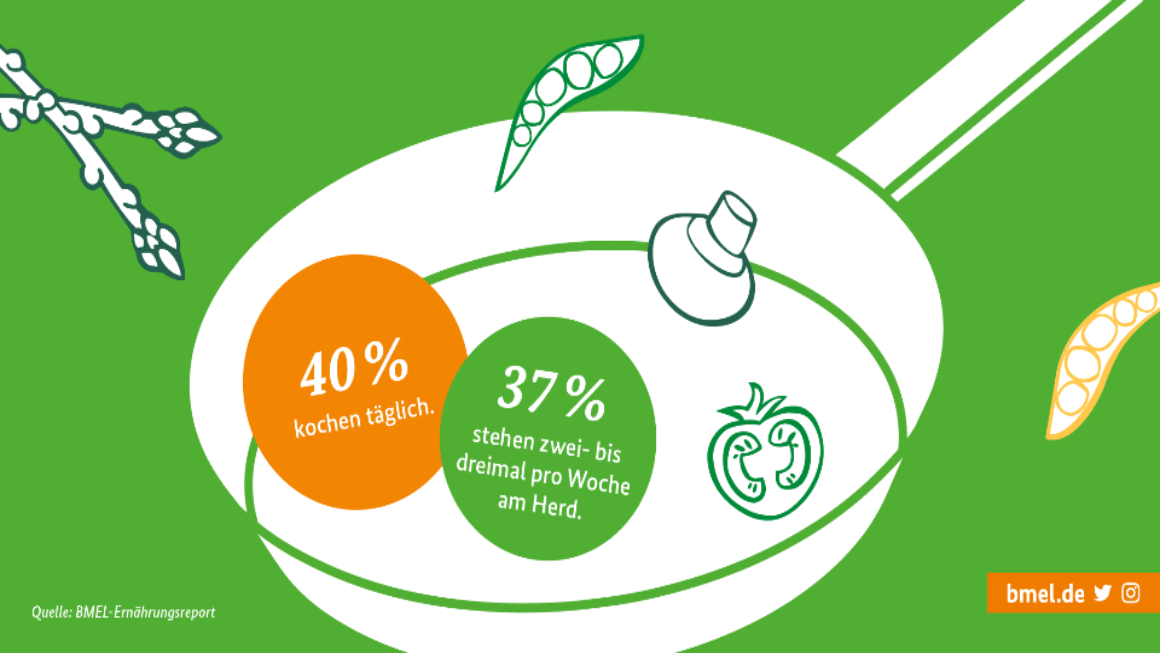
Image taken from bmel.de
<< Hide Menu
6.2 Gesellschaftliche Probleme zu identifizieren und se zu lösen?
5 min read•june 18, 2024
Nathan Wichert
Nathan Wichert
Wie kann man als individuelle Person helfen, komplizierte gesellschaftliche Probleme zu identifizieren und möglicherweise zu lösen?
Just 100 companies have been the source of more than 70% of the world’s greenhouse gas emissions since 1988, according to a 2017 report from the Carbon Disclosure Project (CDP). The report identifies ExxonMobil, Shell, BP, and Chevron as being among the highest-emitting investor-owned companies since 1988. If fossil fuels continue to be extracted at the same rate over the next 28 years as they were between 1988 and 2017, global average temperatures would be on course to rise by 4°C by the end of the century. This is likely to have profoundly disturbing consequences, including substantial species extinction and global food scarcity risks. So what can we do?
Unverpackte-Laden in Deutschland
- Wenn wir durch die Obst und Gemüseabteilung eines durchschnittlichen Supermarktes gehen, könnten wir manchmal einfach nur noch weinen. Oder so richtig wütend werden über den absurden Plastikberg, der sich da vor unseren Augen auftürmt.- When we walk through the fruit and vegetable section of our average supermarket, it's easy to want to cry. Or it's easy to get really angry because of the absurd mountain of plastic that is piling up before our eyes.

Image taken from vzhh.de
Unverpackt-Läden—was sind sie?
Wie funktioniert das eigentlich mit dem verpackungsfreien Einkauf? Statt auf Regale mit einzelnen Produkten fällt der Blick auf Bulk Bins, Kisten mit losem Obst und Gemüse, große Kanister und Metallfässer mit Flüssig-Waren, Trockenprodukte in stattlichen Glasgefäßen, leere Mehrwegbehälter bevorzugt aus Stoff, Edelstahl oder Glas und vieles mehr.
How does that work with packaging-free shopping? Instead of traditional shelves with individual products, there is a focus is on bulk containers, large storage boxes with loose fruit and vegetables, and large canisters and metal containers with liquid goods (think laundry detergent or shampoo). Dry products like beans and pasta are in large glass jars and everyone uses reusable containers made out of glass or stainless steel.

Image taken from smarticular.net
Und im Laden, wie sieht das aus?
Wenn du hier einkaufst, bringst du die Verpackung im Idealfall von zu Hause mit oder kaufst sie im Laden, um sie beim nächsten Mal wieder dabei zu haben. Je nach Produkt, das du kaufen willst, können das, Stoffbeutel, Schraubgläser oder auch Plastikdosen und Papierbeutel sein. Vor dem Einkauf wird die Verpackung abgewogen, damit das Eigengewicht später an der Kasse nicht mitgerechnet wird. Dann kann abgefüllt werden.
If you shop at these types of stores, you will ideally bring your own containers with you from home or buy some in the shop so that you can have them for the next time. Depending on the product you're buying, these containers can be cloth bags, jars with screw-on lids, reusable plastic cans, or even paper bags. The packaging is weighed before shopping so that you don't pay for the container's weight. Once they're weighed and marked, you're free to fill them with whichever product you'll be taking home with you.

Image taken from einbisschengruener.com
Maybe it's time to look at the way we eat. After the fossil fuel industry, the food industry, and in particular the meat and dairy sector, is one of the most important contributors to climate change. In fact, If cattle were their own country, they would be the world’s third-largest emitter of greenhouse gases after China and the US‼️

Image taken from wri.org.
Mann muss nicht Veganerin oder Veganerin sein
Du musst nicht all-in gehen. Du kannst beginnen, schrittweise zu reduzieren und ein „ flexitarian“ zu werden. Ein flexitarian ist eine Person, die halbvegetarisch isst. Diese Art der Ernährung konzentriert sich auf pflanzliche Lebensmittel und nur die gelegentliche Einbeziehung von Fleisch.
You don't need to go all in. You can start by cutting down gradually and becoming a ‘flexitarian.’ A Flexitarian is a person who maintains a semi-vegetarian diet. This type of diet is centered around plant foods and only the occasional inclusion of meat.

Image taken from heise.de
Ein bisschen summiert sich schnell (A little bit adds up quickly)
Indem Sie deinen Verbrauch an tierischem Eiweiß um die Hälfte (5️⃣0️⃣%) reduzieren, kannst du den CO2-Fußabdruck deiner Ernährung um mehr als 40% senken❗Ein größerer Ansatz könnte so etwas wie das Verbot von Fleisch in einem Unternehmen sein, wie es das Office-Sharing-Unternehmen 'WeWork' im Jahr 2018 getan hat.
By reducing your consumption of animal protein by half (5️⃣0️⃣%), you can cut your diet's carbon footprint by more than 40%❗A larger-scale approach could be something like banning meat across an organization, as office-sharing company WeWork did in 2018.

Image taken from wri.org
Dies könnte in Deutschland 🇩🇪 schwierig sein (This might be difficult in Germany 🇩🇪)
Der deutsche Ernährungsreport 2019 zeigt, dass nur ein Prozent (1%) der Befragten sich vegan ernährt und sechs Prozent (6%) essen vegetarisch. Unter den 14- bis 29-Jährigen sind es dagegen elf Prozent (11%). Fast jeder Dritte (28%) isst täglich Fleisch oder Wurst.
The 2019 German Nutrition Report shows that only 1% of the respondents reported being vegan and 6% reported being vegetarian. Within the range of ages 14-29, 11% of respondents reported being either vegan or vegetarian. Almost 1/3 of respondents (28%) said they eat meat or sausage every day.

Image taken from bmel.de
Was ist den Deutschen wichtig?
Der Geschmack ist dem aktuellen Ernährungsreport zufolge das wichtigste Kriterium. Immerhin 99 Prozent der Befragten gaben an, darauf besonderen Wert zu legen. Die Hälfte (50%) achte zudem auf eine einfache Zubereitung, etwas weiter hinten stehen der Kaloriengehalt und Preis.
So, what's important to Germans? According to the same report, taste is the most important criterion. 99% of all respondents reported placing high importance on this. Half of the people (50%) also think quick and easy preparation is important. Slightly further down on the list of importance came calorie content and price.

Image taken from bmel.de

© 2024 Fiveable Inc. All rights reserved.